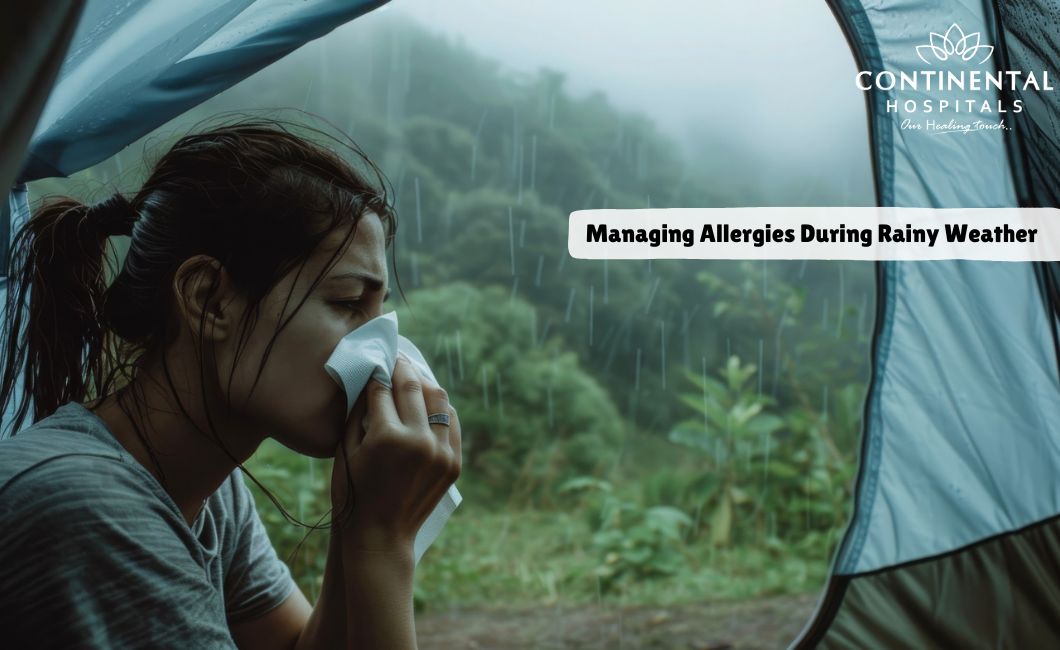Rainy weather can be a blessing for many, bringing relief from the scorching sun and replenishing the earth with much-needed moisture. However, for allergy sufferers, it can also mean a spike in symptoms like sneezing, itching, and congestion. If you find yourself reaching for the tissues more often during rainy days, fear not! With some proactive steps and smart management strategies, you can minimize the impact of allergies and still enjoy the rainy season to the fullest.
Why Does Rain Impact Allergies?
Here's why rainy weather can be a downer for allergy sufferers:
Mold on the Rise: Rain creates a damp environment, perfect for mold growth both indoors and outdoors. Mold spores can trigger allergic reactions, causing symptoms like sneezing, coughing, itchy eyes, and a runny nose.
Pollen Power-Up: Contrary to popular belief, rain doesn't necessarily wash away pollen. Instead, it can break pollen grains into smaller particles, making them more airborne and easier to inhale, leading to increased allergy symptoms.
Dust Mite Delight: High humidity levels during rainy weather create an ideal environment for dust mites to thrive. These microscopic creatures and their waste products are common allergy triggers, causing symptoms like congestion, itchy eyes, and difficulty breathing.
Don't Let Allergies Rain on Your Parade: Preventive Measures
Fear not, allergy sufferers! By following these preventive measures, you can significantly reduce the impact of rain on your allergies:
Become a Weather Watcher: Stay informed about the weather forecast, particularly pollen and mold counts. During peak allergy days, limit your time outdoors and keep windows closed.
Seal the Deal: Invest in good quality air filters for your home and consider using a dehumidifier to control indoor humidity levels, especially during the rainy season. This will help reduce dust mite populations and mold growth.
Shower Power: After spending time outdoors, especially during rain, take a shower to wash away any pollen or mold spores that may have landed on your hair and skin. Change into clean clothes as well.
Laundry Love: Wash your clothes regularly, especially after being outdoors on rainy days. This helps remove any allergens that may have clung to your clothes.
Bedding Blitz: Don't forget to wash your bedding regularly in hot water (at least 55°C or 130°F) to kill dust mites. Encase your pillows and mattresses in allergen-proof covers for added protection.
Mask Up, Wise Up: When venturing outdoors during high pollen or mold counts, consider wearing a pollen mask to filter out allergens.
Medication Marvels: Talk to your doctor about allergy medications like antihistamines and nasal corticosteroids. These can help manage symptoms and provide relief.
Saline Solution Savior: Use a saline nasal spray to help clear mucus and soothe irritated nasal passages.
Natural Remedies for Allergy Relief
Here are some natural remedies you can consider for managing allergy symptoms during the rainy season:
Local Honey: Consuming local honey may help reduce allergy symptoms by introducing small amounts of pollen, allowing your body to build tolerance gradually. (Consult your doctor before trying this if you have any concerns about allergies to bee products.)
Steam Power: Inhaling steam can help loosen mucus and clear congestion. Take a hot shower or use a humidifier to create a steamy environment.
Nettle Power: Nettle leaf tea is a natural antihistamine that may help alleviate allergy symptoms like itching, sneezing, and runny nose. (Talk to your doctor before consuming nettle leaf tea if you have any underlying medical conditions or are taking medications.)
Quercetin Powerhouse: Quercetin, a natural compound found in fruits and vegetables like apples, onions, and berries, may help reduce inflammation and manage allergy symptoms.
Living with Allergies During the Rainy Season: Additional Tips
Track Your Triggers: Keeping a journal to track your allergy symptoms and the weather conditions can help you identify your specific triggers and plan accordingly.
Strengthen Your Immunity: Maintain a healthy diet rich in fruits, vegetables, and whole grains to boost your immune system and fight off allergens more effectively.
Stress Less, Breathe Easier: Stress can worsen allergy symptoms. Practice relaxation techniques like yoga or meditation to manage stress and improve overall well-being.
Seek Professional Help: If your allergy symptoms are severe or don't improve with home remedies, consult your doctor for a personalized treatment plan.
Embrace the Rains, Not the Allergies:
By incorporating these preventive measures and natural remedies into your routine, you can significantly reduce the impact of rainy weather on your allergies. Remember, a little planning and preparation can go a long way in ensuring you enjoy the refreshing showers and vibrant greenery of the monsoon season without the misery of allergies.
Conclusion
Rainy weather doesn't have to dampen your spirits or exacerbate your allergies. By understanding the factors that contribute to rain-related allergies and implementing effective management strategies, you can minimize your symptoms and enjoy the rainy season comfortably. Remember to stay vigilant, stay indoors when necessary, and seek professional help if needed to keep your allergies under control. With the right approach, you can navigate rainy days with ease and focus on enjoying the beauty of the season.
Related Blog Articles:
.webp)







